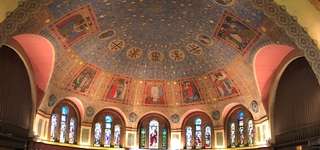|
Back
A great blend of architecture and music Toronto
St. Anne’s Anglican Church
04/17/2019 - & April 19*, 2019
Olivier Messiaen: O sacrum convivium
Francis Poulenc: Salve Regina
Frank Martin: Mass for Double Choir
Zoltán Kodály: Jesus and the Traders
Sergei Rachmaninoff: The Cherubic Hymn
Krzysztof Penderecki: Song of Cherubim
Alfred Schnittke: Concerto for Choir: “Complete this work which I began”
Healey Willan: An Apostrophe to the Heavenly Host
The Toronto Mendelssohn Choir, David Fallis (conductor), Ezra Burke (associate conductor) 
(Courtesy of Toronto Mendelssohn Choir)
This year’s Easter presentation by the Toronto Mendelssohn Choir (“Sacred Music in a Sacred Space“) took place at St. Anne’s Anglican Church a heritage building whose interior was decorated in the 1920s by notable artists in a style hearkening back to art nouveau. The space thus related nicely with the program of 20th century music composed between 1910 and 1987, a time period that experienced the emergence of various musical philosophies and styles. The word “rapt“ best describes the approach of all eight composers.
The first half was performed by the 64-member Mendelssohn Singers while the second half, with its focus on eastern Christian modes, employed the full 118-voice TMC.
The major work was quite a revelation: Frank Martin’s Mass for Double Choir, composed in the 1920s but not performed until 1963. The work has a declarative sureness about it despite the youngish age of the composer, as did this performance.
Frank Martin was French-Swiss and his work was preceded by two French works. First was Olivier Messiaen’s O sacrum convivium (from 1937), a piece in which the subtle flow implies a barely constrained drama just beneath the surface. This was followed by Francis Poulenc’s meditative Salve Regina of 1941, such a contrast from earlier works like his Chansons gaillardes, but a foreshadowing of Dialogues des carmélites.
The second half opened with Zoltán Kodály’s Jesus and the Traders, a compact dramatic cantata dating from 1934. The fact that it was sung in English guaranteed that the story, with its turbulent action and skillfully-structured climax.
We then heard a text in Church Slavonic set by two composers: The Cherubic Hymn, first by Rachmaninoff (from 1910) and then Krzysztof Penderecki (1987). The Rachmaninoff is a familiar favourite and the Penderecki (written as a 60th birthday gift for Mstislav Rostropovich) could well become one.
Alfred Schnittke’s “Complete this work which I began” is the final movement of his Concerto for Choir (1984-85). It becomes increasingly ethereal, almost as if the composer and choir are breathing their last. It certainly whets ones appetite for hearing the entire work.
The program concluded with what can almost be called the choir’s signature work, Healey Willan’s An Apostrophe to the Heavenly Hosts, commissioned by the choir and first performed in 1923. Once again for double choir, it shows influence from both the eastern luturgical tradition and Willan’s Anglo-Catholic style.
David Fallis is the TMC’s interim conductor and music advisor while they seek a new music director. His cheerful presence is familiar thanks to his leadership of the Toronto Consort and from conducting many productions of Opera Atelier. The performances of this program have been part of the choir’s 125th Anniversary Season.
Michael Johnson
|